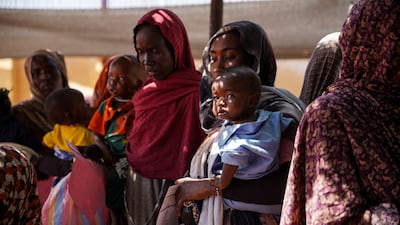At least 400,000 people have fled Sudan’s Zamzam displacement camp in less than three weeks due to heavy violence and fighting, Doctors Without Borders (MSF) said on Thursday.
The findings by the medical charity, published in a report titled Besieged, Attacked, Starved, said hundreds of thousands of people are at risk of atrocities being committed in North Darfur, where the camp is situated.
“The Rapid Support Forces [RSF] and their allies conducted a large-scale ground offensive in April on Zamzam displacement camp, outside El Fasher, causing an estimated 400,000 people to flee in less than three weeks in appalling conditions,” the report said.
“A large portion of the camp population fled to El Fasher, where they remain trapped, out of reach of humanitarian aid and exposed to attacks and further mass violence."
El Fasher is the only city in Darfur − a region of western Sudan about the size of France − that remains under army control, with the rest held by the RSF. The city has been besieged by the RSF since May last year, with the army's 6th Infantry Division and allied groups its last defenders. Many of El Fasher's residents have fled to escape the fighting.
MSF urged “the warring parties to halt indiscriminate and ethnically targeted violence, and facilitate an immediate large-scale humanitarian response”.
The harrowing level of violence on the roads out of El Fasher and Zamzam means many people are trapped or are taking life-threatening risks to escape the city, the report said.
“Men and boys are at high risk of killing and abduction, while women and girls are subjected to widespread sexual violence,” it said.
MSF said it was “extremely concerned about the threats of a full-blown assault on the hundreds of thousands of people in the state capital of El Fasher, which would lead to further bloodshed”.
The RSF and the army have been locked in a devastating civil war since April 2023. At least 40,000 people have been killed and nearly 13 million displaced, including to other countries, according to figures from the UN.
“As patients and communities tell their stories to our teams and asked us to speak out, while their suffering is hardly on the international agenda, we felt compelled to document these patterns of relentless violence that have been crushing countless lives in general indifference and inaction over the past year," Mathilde Simon, MSF’s humanitarian affairs adviser, said in the report.
The agency had to close down its medical services in El Fasher in August 2023 and in Zamzam camp in February this year because of attacks on healthcare workers and facilities.
“In May 2024 alone, health facilities supported by MSF in El Fasher endured at least seven incidents of shelling, bombing or shooting by all warring parties,” the report said.
The southern part of El Fasher saw renewed clashes between the army and the RSF this week despite the UN calling for a week-long ceasefire in the city to allow distribution of aid, a proposal the army accepted.
"Recent unilateral announcements of a possible local ceasefire have not yet been translated into concrete change on the ground," MSF said. "Time is running out."

